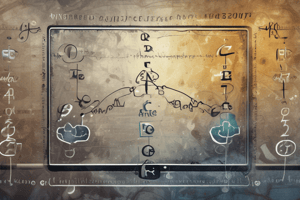Podcast
Questions and Answers
What is the term for the separation of ions that occurs when an ionic compound dissolves in water?
What is the term for the separation of ions that occurs when an ionic compound dissolves in water?
- Dissociation (correct)
- Precipitation
- Ionization
- Combination
How many ions are produced per formula unit of sodium chloride when it dissolves in water?
How many ions are produced per formula unit of sodium chloride when it dissolves in water?
- Four ions
- One ion
- Two ions (correct)
- Three ions
When calcium chloride dissolves in water, how many total moles of ions are produced from 1 mole of calcium chloride?
When calcium chloride dissolves in water, how many total moles of ions are produced from 1 mole of calcium chloride?
- 1 mole
- 4 moles
- 3 moles (correct)
- 2 moles
What does (aq) indicate in a chemical equation?
What does (aq) indicate in a chemical equation?
Assuming 100% dissociation, what does a solution containing 1 mole of sodium chloride contain?
Assuming 100% dissociation, what does a solution containing 1 mole of sodium chloride contain?
Which term is used to represent the separation of ions from one another when an ionic compound dissolves in water?
Which term is used to represent the separation of ions from one another when an ionic compound dissolves in water?
Which type of equation includes only those compounds and ions that undergo a chemical change in a reaction in an aqueous solution?
Which type of equation includes only those compounds and ions that undergo a chemical change in a reaction in an aqueous solution?
What process is different from dissociation and forms ions from solute molecules in a polar solvent?
What process is different from dissociation and forms ions from solute molecules in a polar solvent?
Which type of compounds can also form ions in solution, usually when they are polar?
Which type of compounds can also form ions in solution, usually when they are polar?
What type of compounds can be considered insoluble for most practical purposes due to their very low solubility?
What type of compounds can be considered insoluble for most practical purposes due to their very low solubility?
Which type of ions are found in solution both before and after the reaction and do not take part in a chemical reaction?
Which type of ions are found in solution both before and after the reaction and do not take part in a chemical reaction?
What provides the energy needed to break the covalent bonds during the ionization of molecular solutes in solution?
What provides the energy needed to break the covalent bonds during the ionization of molecular solutes in solution?
Which type of equations represent reactions of ions in aqueous solution instead of formula equations?
Which type of equations represent reactions of ions in aqueous solution instead of formula equations?
Which compound is soluble because it contains sodium, as mentioned in the text?
Which compound is soluble because it contains sodium, as mentioned in the text?
Which equation applies not only to the reaction between $(NH4)2S$ and $Cd(NO3)2$ but also to any reaction where a precipitate of cadmium sulfide forms?
Which equation applies not only to the reaction between $(NH4)2S$ and $Cd(NO3)2$ but also to any reaction where a precipitate of cadmium sulfide forms?
When an ionic compound dissolves, the ions separate from each other in a process called ionization.
When an ionic compound dissolves, the ions separate from each other in a process called ionization.
Each formula unit of calcium chloride gives two ions in solution.
Each formula unit of calcium chloride gives two ions in solution.
In a solution that contains 1 mole of calcium chloride, there are 2 moles of Cl− ions.
In a solution that contains 1 mole of calcium chloride, there are 2 moles of Cl− ions.
All soluble ionic compounds have less than 100% dissociation in water.
All soluble ionic compounds have less than 100% dissociation in water.
The dissociation of one formula unit of sodium chloride results in two moles of Cl− ions.
The dissociation of one formula unit of sodium chloride results in two moles of Cl− ions.
Net ionic equations include only those compounds and ions that undergo a chemical change in a reaction in an aqueous solution.
Net ionic equations include only those compounds and ions that undergo a chemical change in a reaction in an aqueous solution.
Ions formed by a molecular solute when it ionizes in a polar solvent are not hydrated.
Ions formed by a molecular solute when it ionizes in a polar solvent are not hydrated.
The precipitation of cadmium sulfide can be shown by an overall ionic equation.
The precipitation of cadmium sulfide can be shown by an overall ionic equation.
Ionic compounds that dissolve in water undergo dissociation, where the ions present separate from one another.
Ionic compounds that dissolve in water undergo dissociation, where the ions present separate from one another.
All soluble ionic compounds are shown as dissociated ions in solution in net ionic equations.
All soluble ionic compounds are shown as dissociated ions in solution in net ionic equations.
Flashcards are hidden until you start studying
Study Notes
Dissociation of Ionic Compounds
- The separation of ions that occurs when an ionic compound dissolves in water is called dissociation.
- One formula unit of sodium chloride (NaCl) dissolves in water to produce two ions: Na+ and Cl-.
- When calcium chloride (CaCl2) dissolves in water, one formula unit produces three ions: Ca2+ and two Cl-.
Chemical Equations
- The symbol (aq) in a chemical equation indicates that the species is dissolved in water.
- Net ionic equations represent reactions of ions in aqueous solution and only include those compounds and ions that undergo a chemical change.
Ionic Compounds in Solution
- Assuming 100% dissociation, a solution containing 1 mole of sodium chloride contains 1 mole of Na+ and 1 mole of Cl-.
- Ionic compounds that dissolve in water undergo dissociation, where the ions present separate from one another.
- Soluble ionic compounds are shown as dissociated ions in solution in net ionic equations.
Ionization and Solubility
- Ionization is the process of forming ions from solute molecules in a polar solvent, which is different from dissociation.
- Molecular solutes, such as sugar, can also form ions in solution, usually when they are polar.
- Insoluble compounds have very low solubility and can be considered insoluble for most practical purposes.
- The energy needed to break the covalent bonds during the ionization of molecular solutes in solution is provided by the polar solvent.
Ions and Precipitation
- Spectator ions are found in solution both before and after the reaction and do not take part in a chemical reaction.
- The precipitation of cadmium sulfide can be shown by an overall ionic equation.
Studying That Suits You
Use AI to generate personalized quizzes and flashcards to suit your learning preferences.




